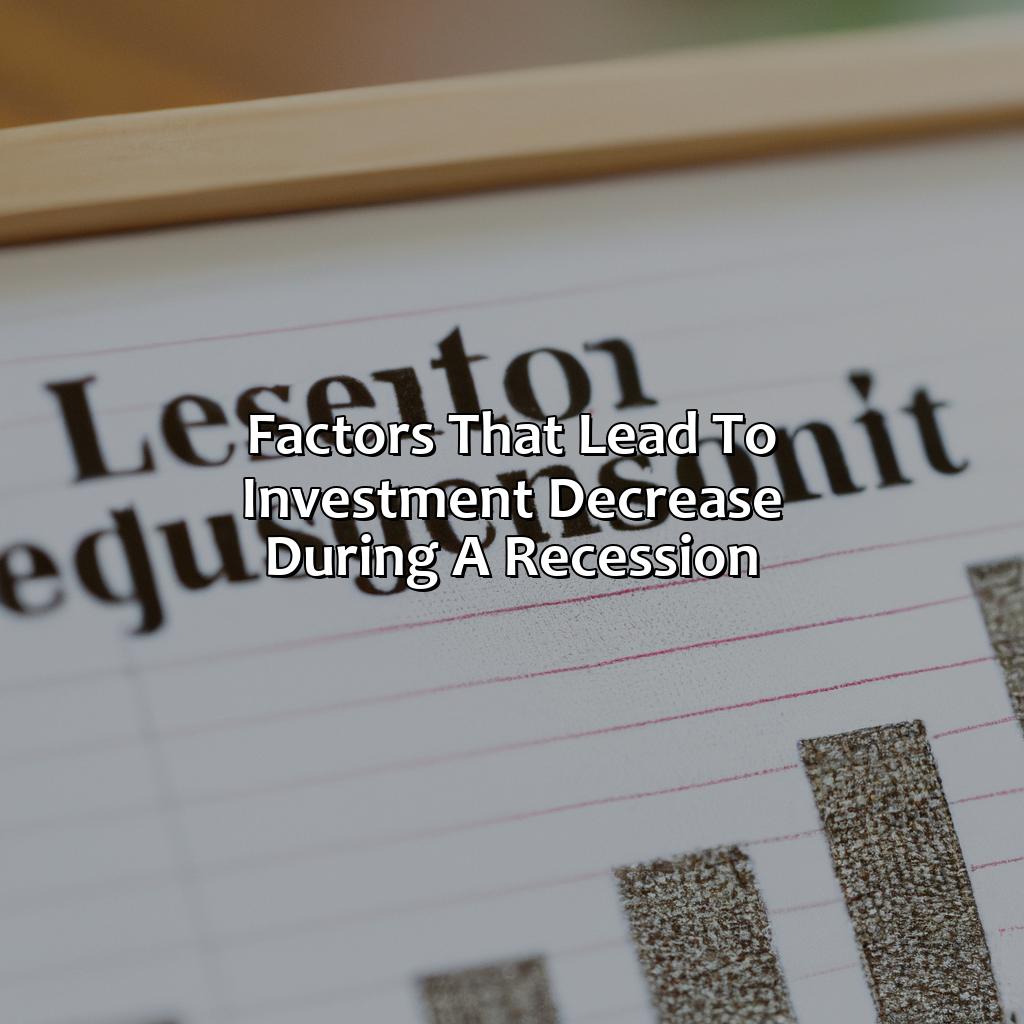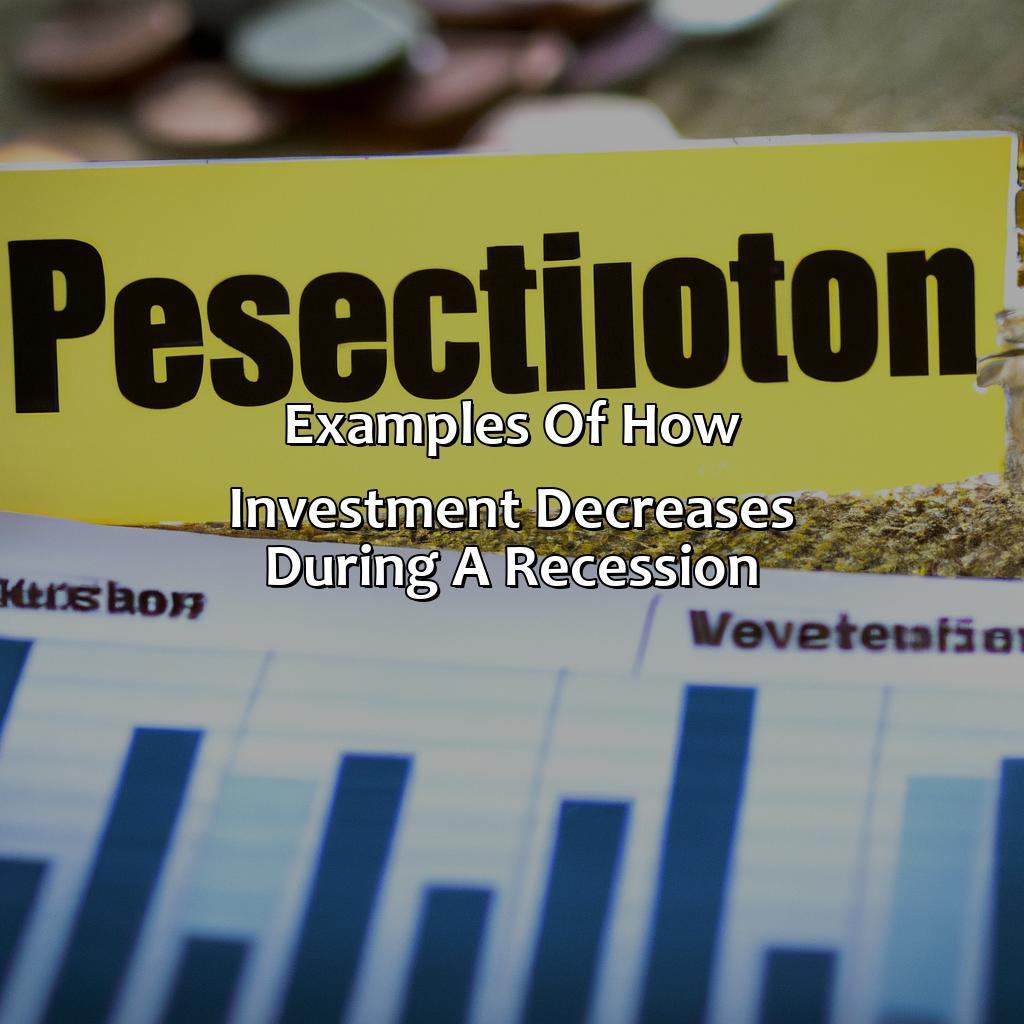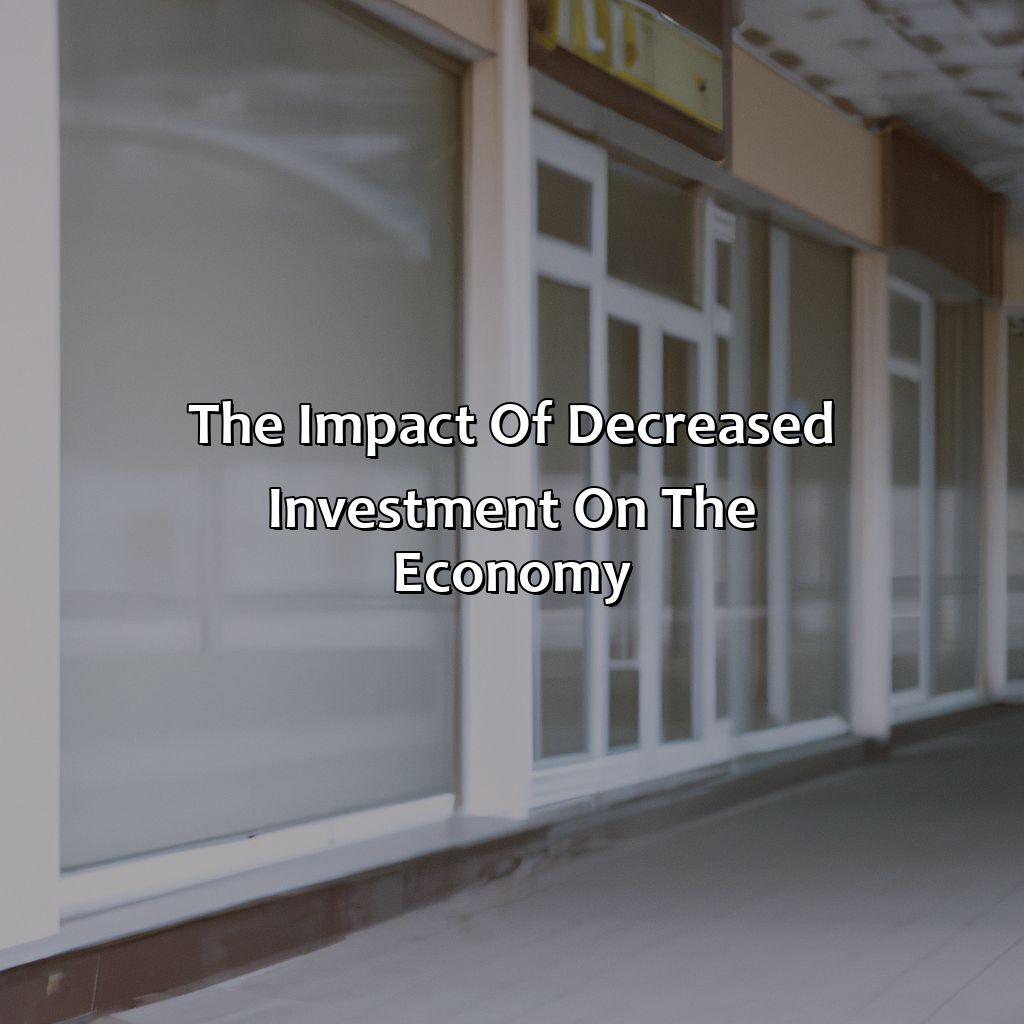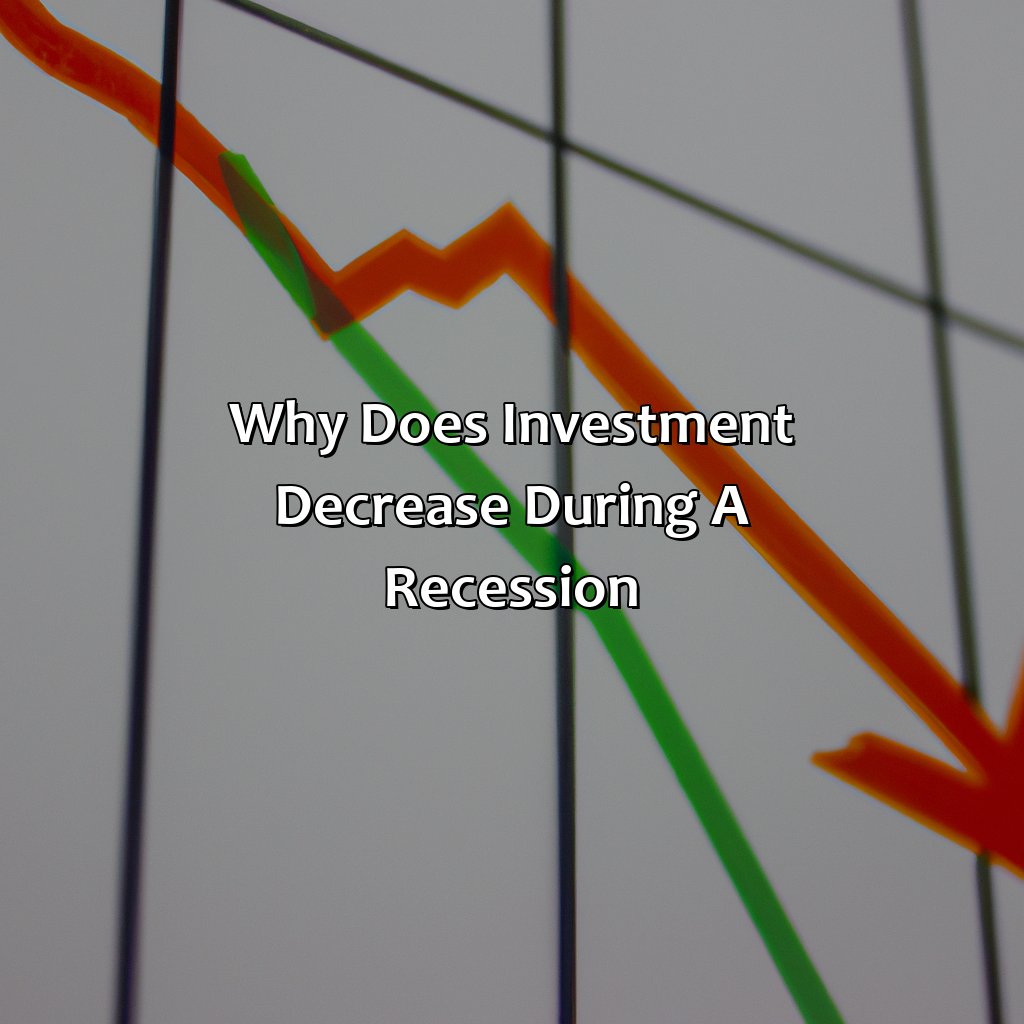Why Does Investment Decrease During A Recession?
Key Takeaway:
- Investment is crucial to an economy: Investment drives economic growth, job creation, and technological advancement. Without investment, the economy can decline, and the standard of living can decrease.
- Several factors lead to a decrease in investment during a recession: Factors such as lack of investor confidence, decreased consumer spending, and tighter credit markets can lead to a decrease in investment during a recession. These factors can cause businesses and individuals to be less willing to invest and take risks.
- The impact of decreased investment on the economy can be severe: A decrease in investment can lead to a decline in employment, reduced productivity, and a slowdown in technological innovation. These effects can extend beyond the recession and have long-term implications for the economy.
Have you ever wondered why investments decrease during a recession? It’s essential to understand why these fluctuations occur, as the economic climate can have a huge impact on our financial decisions. Learn more about the causes and effects of recessions on investment today.
Importance of investment
Investment is a vital driver of economic growth, as it leads to the creation of new businesses, employment opportunities, and innovation. During a recession, the Importance of investment decreases because individuals and businesses become more cautious about spending and investing, leading to a decline in demand. As a result, businesses scale back production and layoff employees, creating a vicious cycle of reduced demand and investment.
The decrease in investment during a recession exacerbates the economic downturn, as businesses are unwilling to invest in research and development, or upgrade their infrastructure. The Importance of investment also impacts the level of public services, as governments have less money to spend on infrastructure projects. This lack of investment can have long-term effects on economic growth, hindering progress and development.
It is worth noting that periodic economic recessions are not unusual and are often a result of cyclical market movements. The Importance of investment may decrease for a short period during these times, but history has shown that economies recover eventually and that investments made before the recession will yield a return over a longer period.
In 1929, for example, the stock market crash led to an economic depression that lasted for several years. During this period, the Importance of investment decreased dramatically, leading to widespread economic hardship. However, as the global economy recovered, investment levels slowly began to rise, leading to increased growth and prosperity.

Image credits: retiregenz.com by Harry Washington
Factors that lead to investment decrease during a recession
Why does investment decrease during a recession? To find out, let’s take a look at some factors. Investor confidence falls, consumer spending drops, and credit markets are tighter. These can all contribute to fewer investments during economic downturns. Let’s delve deeper into each of these sub-sections for further understanding.

Image credits: retiregenz.com by Adam Washington
Lack of investor confidence
Investor apprehension is a crucial factor leading to reduced investment during a recession. Investors tend to hold their money in reserve due to the uncertain market conditions they face. This leads to lower demand for investing in businesses, which results in reduced investment levels across various sectors.
In such a scenario, investors prefer to invest their funds in safer options like government bonds and other low-risk securities instead of taking higher financial risks by investing it in businesses. As a result, the market loses its liquidity, and investments dip significantly.
The lack of investor confidence can lead to volatile markets with sudden drops and spikes affecting overall investments. The uncertainty of how long an economic recession might prevail adds more apprehension to investors’ decision making.
One suggestion would be for governments to provide stimulus packages directed towards supporting medium and small-scale businesses. Such support which can encourage entrepreneurs could help attract foresighted investors looking for long-term gains rather than short-term returns alone. Providing tax benefits or relaxation in financial laws could increase market participation from potential investors, thereby ensuring that liquidity is maintained even during a recession phase.
Looks like even our wallets are going through a recession diet.
Decreased consumer spending
The economic recession brings about a decline in consumer spending, leading to reduced investment opportunities. A dip in consumer demand lowers revenue, generating uncertainty for businesses and reducing investor confidence. Companies reduce their operations resulting in lower workforce productivity and higher unemployment rates, creating a ripple effect on the economy with decreased investment options. The decrease is due to low profits for companies, which have limited funds available for investment purposes.
Moreover, investors move towards safer options such as bonds or savings accounts that offer more stable returns than fluctuating stock markets. The decrease in investment further lowers the GDP and increases debt rates leading to a long-term economic slowdown.
During recent global recessions such as the 2008 financial crisis, decreased consumer spending triggered by high credit rates and liquidity crunch toppled businesses globally. As people started losing jobs because of bankruptcies, it further increased the recession’s impact with fewer job opportunities and more people struggling financially.
When banks start saying ‘no’ to loans, it’s like telling a toddler ‘no’ to candy – they’re both going to throw a tantrum.
Tighter credit markets
During recessionary periods, access to credit becomes limited due to several economic factors. This reduction in the available credit is called ‘tighter credit markets’. When there is a shortage of funds and liquidity, it is challenging for businesses to secure investments and financing. The implementation of stricter lending standards by financial institutions also leads to tighter credit markets during these periods.
As a result of tight credit markets, investors become hesitant about investing money since they perceive a higher level of risk. The overall perception that the economy is unstable during economic downturns further increases this mindset. Consequently, businesses struggle to access capital that would typically be available in better economic times, which could lead to missed opportunities or even bankruptcy.
Investors should remain vigilant in monitoring the market patterns during an economic slowdown while seeking reliable investment opportunities and long-term financial planning options. Seeking out expert advice from professional financial planners and economists helps in making informed decisions during this period of decreased investment opportunities.
Investment during a recession: it’s like being stuck in quicksand, the more you struggle, the deeper you sink.
Examples of how investment decreases during a recession
Investment can decline during a recession. To understand this, let’s explore examples. Real estate investments can dip. Business spending also decreases. Both factors contribute to a decrease in investment during an economic downturn.

Image credits: retiregenz.com by Adam Washington
Decline in real estate investment
Investment in the real estate sector tends to decrease during a recession due to several factors:
- People have less disposable income, making them less likely to invest in property or take out mortgages.
- Banks are less willing to lend money, as they become risk-averse during times of economic uncertainty. This results in a lack of capital available for property purchases and development projects.
Furthermore, declining consumer confidence also plays a significant role. During recessions, people are generally more cautious about their spending and may delay buying property until the economy has recovered. This creates a decrease in demand for properties and can lead to falling house prices.
It is essential that governments implement policies that aim to stimulate investment in the real estate sector during times of recession. Measures such as tax breaks and incentives could encourage developers to undertake new projects or complete existing ones, resulting in job creation and boosting economic growth.
Overall, it is crucial for both individuals and institutions not to lose sight of the long-term benefits associated with investing in the real estate market. While it may be tempting to withdraw funds during times of economic downturns, history indicates that the market will eventually recover, making it a wise investment decision.
Looks like during a recession, businesses tighten their belts harder than my pants after a buffet.
Decrease in business spending
During economic downturns, there is a notable decline in capital expenditure by businesses or companies. This decrease in financial investment is due to the uncertainty created by the recessionary environment, which makes business owners cautious about making long-term financial commitments. Consequently, businesses tend to reduce their spending on non-essential items to sustain themselves during an extended period of decreased economic activity.
One significant implication of this trend is a dip in investments, particularly in stocks and other equity securities. Companies that retain cash reserves or debt facilities may do so to avoid external financing during an uncertain economy. The reduction in investment also leads to a lower demand for goods and services across the market, contributing to deflationary tendencies.
Furthermore, it is important to note that history has shown that almost every recession has seen a notable decrease in business spending. In the 2008 financial crisis, companies cut back expenses such as marketing and advertising costs while curtailing capital expenditures on new projects. Some firms also reduced dividends along with their share repurchase programs as part of cost-cutting measures.
Overall, a decrease in business spending can create significant implications for both small and large-scale enterprises. It paints a bleak picture indicating negative economic growth and stalls progress towards expansionism at an individual level as well as at a national scale.
When investment takes a dive, the economy takes a grand piano straight to the face.
The impact of decreased investment on the economy
When investment decreases during a recession, it causes significant negative impacts on the economy. The reduced investment leads to a drop in demand for goods and services, lowering production levels, and increasing unemployment rates, leading to reduced consumer spending. This, in turn, results in decreased economic growth, weaker output, and lower levels of business investment. Consequently, the reduced investment leads to an overall slowdown in the economy, creating a vicious cycle of economic contraction.
Moreover, the reduced investment also affects businesses as they struggle to secure funding for their operations. As profits and revenues decline, companies may face difficulty accessing credit from banks, which further weakens their operations. The reduced investment also impacts capital formation, leading to inadequate funds for research and development, innovation, and other essential business operations. As a result, companies lose their competitive edge, making it more challenging to compete in a global economy.
A True History worth considering is the impact of the 2008 financial crisis, which caused a decline in investment levels globally, leading to a severe contraction in the world economy. The decrease in investment levels led to widespread business failures and job losses, resulting in the slowest economic growth in the United States since World War II. This history suggests that reduced investment has significant adverse effects on the economy, significantly impacting growth, production, and overall economic outcomes.

Image credits: retiregenz.com by Joel Duncun
Some Facts About Why Investment Decreases During a Recession:
During a recession, businesses tend to cut back on investments in order to conserve cash and reduce risk. (Source: Investopedia)
A drop in consumer spending and demand for goods and services also contributes to a decrease in investment during a recession. (Source: The Balance)
Uncertainty about economic conditions and a lack of confidence in the market can lead to hesitation in investing during a recession. (Source: Forbes)
Financial institutions may tighten lending standards during a recession, making it more difficult for businesses to access capital for investment. (Source: CNBC)
The unpredictability and potential for prolonged economic downturn during a recession can deter investors from taking risks with their money. (Source: The New York Times)
FAQs about Why Does Investment Decrease During A Recession?
Why does investment decrease during a recession?
During a recession, individuals and businesses tend to decrease their spending and focus on saving money. This causes a decrease in demand for goods and services, which ultimately leads to a decrease in the need for investment. Investors tend to be more risk-averse during a recession, which can also contribute to decreased investment.
How does a recession affect investor confidence?
A recession can negatively impact investor confidence, as it can lead to stock market volatility and significant losses in investment portfolios. The uncertainty and economic downturn can cause investors to become more cautious and hold onto their money rather than investing it.
What industries or sectors are most affected by a decrease in investment during a recession?
Industries that are heavily reliant on discretionary spending, such as travel and entertainment, are often hit the hardest during a recession. Additionally, capital-intensive industries like manufacturing and construction may also see significant decreases in investment during a recession due to decreased demand.
Can government policies mitigate the effects of decreased investment during a recession?
Yes, the government can implement policies such as lowering interest rates or increasing government spending to encourage investment and stimulate the economy. These policies can help boost economic activity and increase investor confidence, leading to increased investment.
What are some long-term effects of decreased investment during a recession?
Decreased investment during a recession can have long-term effects on economic growth, job creation, and innovation. Businesses may struggle to secure funding for new projects and initiatives, leading to a slowdown in technological advances and economic progress. Additionally, reduced investment can lead to reduced job opportunities and lower wages, contributing to a sluggish economy.
How can individual investors protect their portfolios during a recession?
Individual investors can protect their portfolios during a recession by diversifying their investments, investing in defensive stocks like utilities and consumer staples, and keeping a long-term investment strategy in mind. It can also be helpful to consult with a financial advisor and stay informed about economic trends and developments.
 Checkout this IRS Loophole
Checkout this IRS Loophole 
